Are you planning to relocate to Spain and don’t know where to start? Are you a Spanish national thinking of coming back to Spain after more than 5 years in the UK?
Relocating to Spain
By Barry Davys
This article is published on: 27th June 2025

Barry Davys was a guest with the Spanish Chamber of Commerce alongside Kle&Vera – the international law firm, in the UK for a recent webinar on Relocating to Spain & the Financial Insights.
You can watch part of this webinar below:
If you have any questions after watching the video or would like to talk to Barry, please use the online calendar booking system to choose a time that suits you.
French financial update June 2025
By Katriona Murray-Platon
This article is published on: 7th June 2025
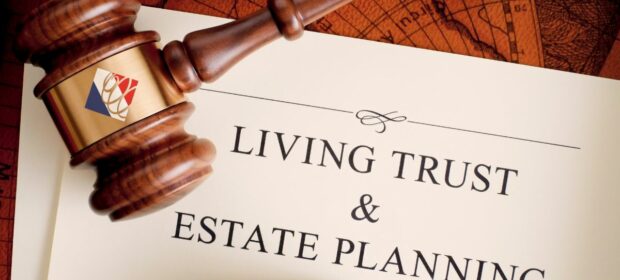
Although the official beginning of Summer is not for a few weeks, these last few weeks of lovely sunny weather already makes it feel like summer is here.
Tax season is almost at a close. Those in departments numbered over 55 have until Thursday 5th June to finalise their tax declarations. I hope you managed to submit your returns in time.
If you now realise that you missed out some income or misdeclared income, you can still amend your tax return on the online webpage. Please note however that as the return has been filed by the deadline, this will generate a tax statement and any tax due on this first statement must be paid promptly. If you amend your return on the website now, this will generate a second statement which may request more tax from you and therefore adjust your monthly payments or will result in a tax rebate. Whichever the case, you must pay the first tax statement first and wait until the second statement is issued.
In June there is still one more declaration to complete if you are a trustee of a trust for which one of the beneficiaries, settlors or trustees are French resident. A trust must also be declared if it contains French based assets.
Although Trusts do not exist under French law, the French courts have accepted that Trusts set up in other countries can have effects in France (Paris Court of Appeal decision, dated 10 January 1970, Epoux Courtois and others of Ganay) provided that they have been set up in compliance with the laws of the country in which it was set up and that they don’t contain any provisions that go against French public policy (ordre public) especially as regards the réserve heriditaire (mandatory heirs rights).
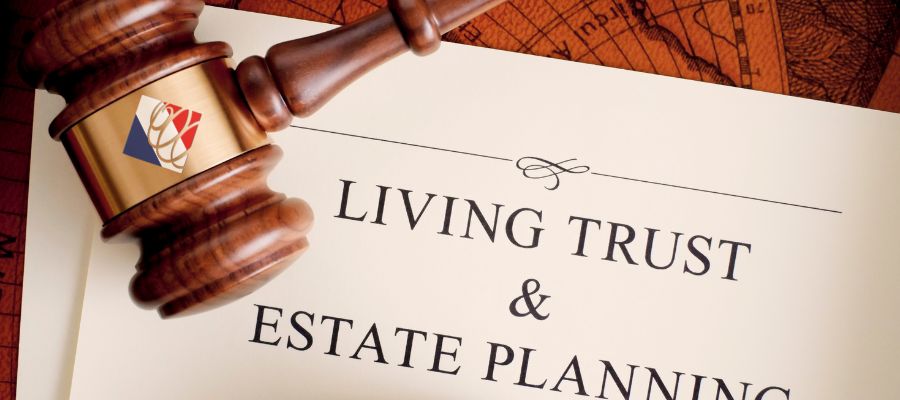
Although generally, if it says Trust in the document, then it needs to be declared, there are some exceptions such as Unit Trusts, a company trust, or an investment trust. Also pension trusts do not need to be declared in the annual trust declaration provided the trustees of these pension trusts are subject to the law of a State which has signed an agreement with the French state to provide administrative assistance in the prevention of fraud and tax evasion (https://bofip.impots.gouv.fr/bofip/7886-PGP.html/identifiant=BOI-DJC-TRUST-20220330). This includes pension trusts in Malta.
There are two declarations that need to be done, TRUST 1 (https://www.impots.gouv.fr/formulaire/2181-trust1/declaration-de-constitution-de-modification-ou-dextinction-dun-trust), if you have never declared the trust before or it is a new trust and TRUST 2 (https://www.impots.gouv.fr/formulaire/2181-trust2/declaration-annuelle-de-la-valeur-venale-au-1er-janvier-des-biens-droits-et- ) which is the annual trust declaration which must be done every year. Unfortunately, you cannot submit these forms online like you can when you do your income tax return, they must be submitted in paper form and sent to the Non-Residents tax office in Noissy-le-Grand before 15th June every year.
For those with Pru Assurance Vies or those thinking of investing in a Pru Assurance Vie there is news as, on Tuesday 27th May 2025, the Prudential Assurance Company (PAC) board reviewed the Prufund Expected Growth Rates (EGR) as part of the quarterly review process. The Expected Growth Rate (EGR) is the forward looking element of the Prufund smoothing process. Pru announced that the EGRs for all the offshore versions of Prufund remain unchanged. The Unit Price Adjustment (UPA) part of the smoothing process, which is a backward looking element, and which is formulaic and non-discretionary are also reviewed quarterly. This quarter there is a negative UPA for the Prufund Cautious fund in GBP of – 2.3%.
At the beginning of June, I shall join some of my colleagues and some of our product providers for our adviser meeting in Paris. It will be interesting catching up with my colleagues and also hearing our providers views on the markets in what has been a very interesting first part of the year!
After all the May bank holidays, I am looking forward to having some normal working weeks and getting lots of work done before the summer holidays. If you have any questions or would like to organise a meeting to discuss your finances, please do get in touch.
FEIFA Annual Adviser Conference
By Peter Brooke
This article is published on: 30th May 2025
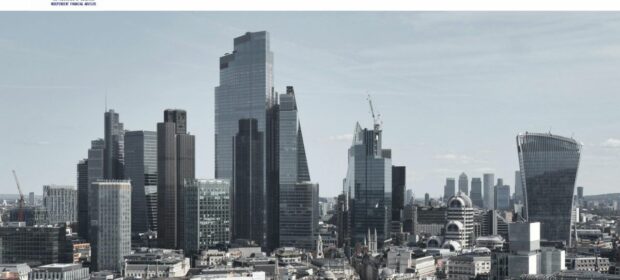
I recently attended the FEIFA Annual Adviser Conference in London and wanted to share a brief summary of the latest market insights, along with how advisers are continuing to evolve their approach to best serve clients in today’s environment.
The Federation of European Independent Financial Advisers (FEIFA) – not to be confused with the football governing body! – was founded 16 years ago by a group of experienced IFA firms across Europe. They saw the need for an organisation that could uphold professional standards and represent the interests of advisers and their clients with both industry bodies and regulators across the continent. Spectrum is proud to be one of the original founding members, and we continue to support and build on those standards through our ongoing involvement.
The annual conference brings together FEIFA members and leading industry voices to discuss the unique challenges of advising cross-border clients. As Head of the Spectrum Investment Committee, it remains a valuable and important event in my calendar.
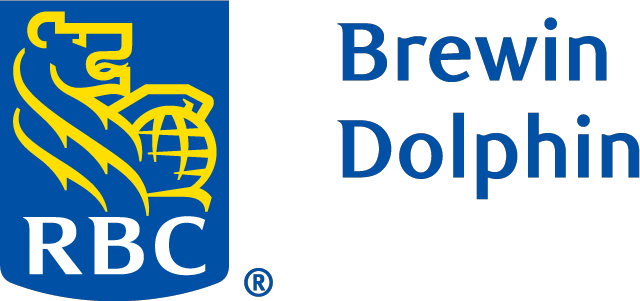
Staying the Course Through Market Volatility
Richard Flood (RBC Brewin Dolphin) reminded us that global events—whether pandemics, wars, or political wrangling —are a constant. Despite this, markets rise over time. The key is to focus on long-term fundamentals rather than react to short-term noise.
Volatility, he stressed, is a normal part of investing and “the price you pay for superior returns.”
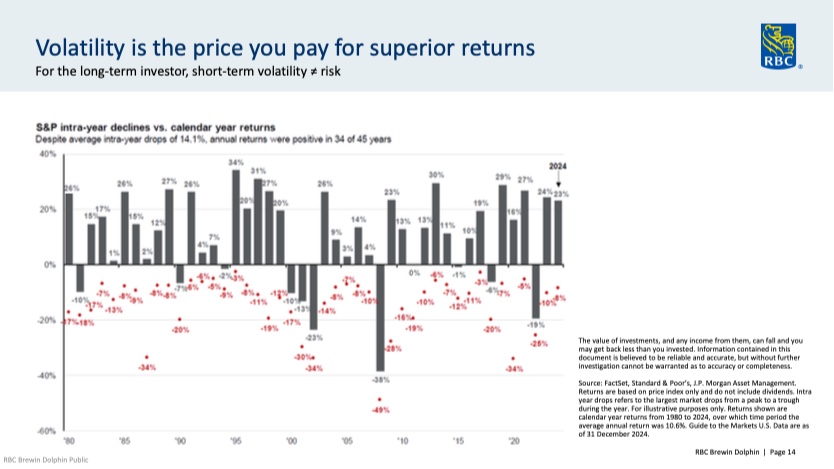
Avoiding volatility by sitting in cash is not a good idea either as Inflation diminishes the purchasing power of cash – as illustrated in this Equities v’s Cash ‘inflation adjusted’ performance chart.
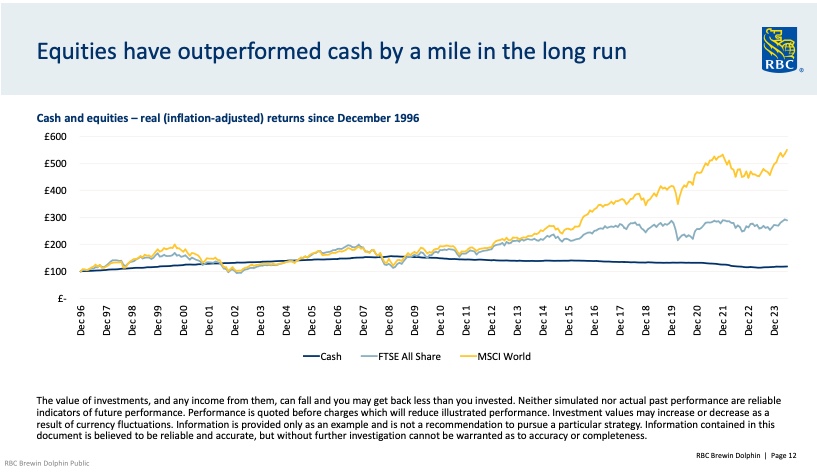

Navigating an Uncertain 2025
David Coombs (Rathbones) highlighted the ongoing impact of geopolitical events like Trump’s executive orders and Tariffs on trade and compared them to other countries ‘protectionist policies’ like unbalanced tax rates (eg Ireland), agricultural subsidies (eg France).
He also stressed the unconsidered challenges that passive investments (eg ETFs) pose to market stability due to being “forced sellers & and forced buyers” therefore adding to volatility.
Active management, in his view, remains vital, especially in 2025, and he shared a wonderful example of how active he has been in the last year:
The below chart is the Shopify share price, a share he has held for some time, the red dots are where he sold some shares (trimmed) and the yellow dots are where he added money – this shows that active management is much more than strategically choosing which companies to own or not own, but how to add value through tactical decisions.
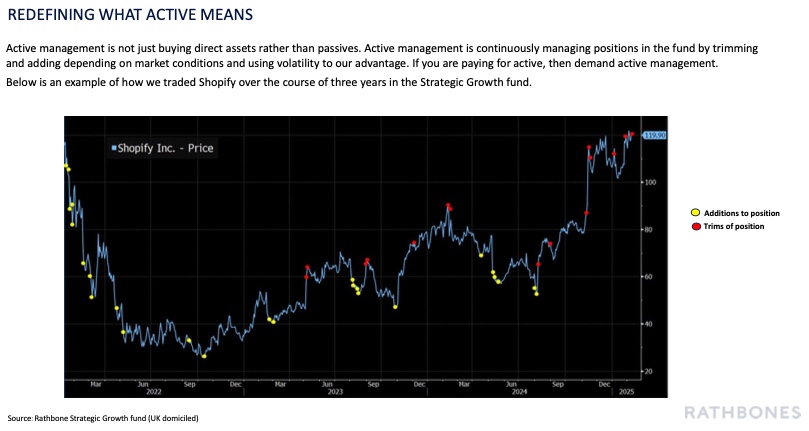
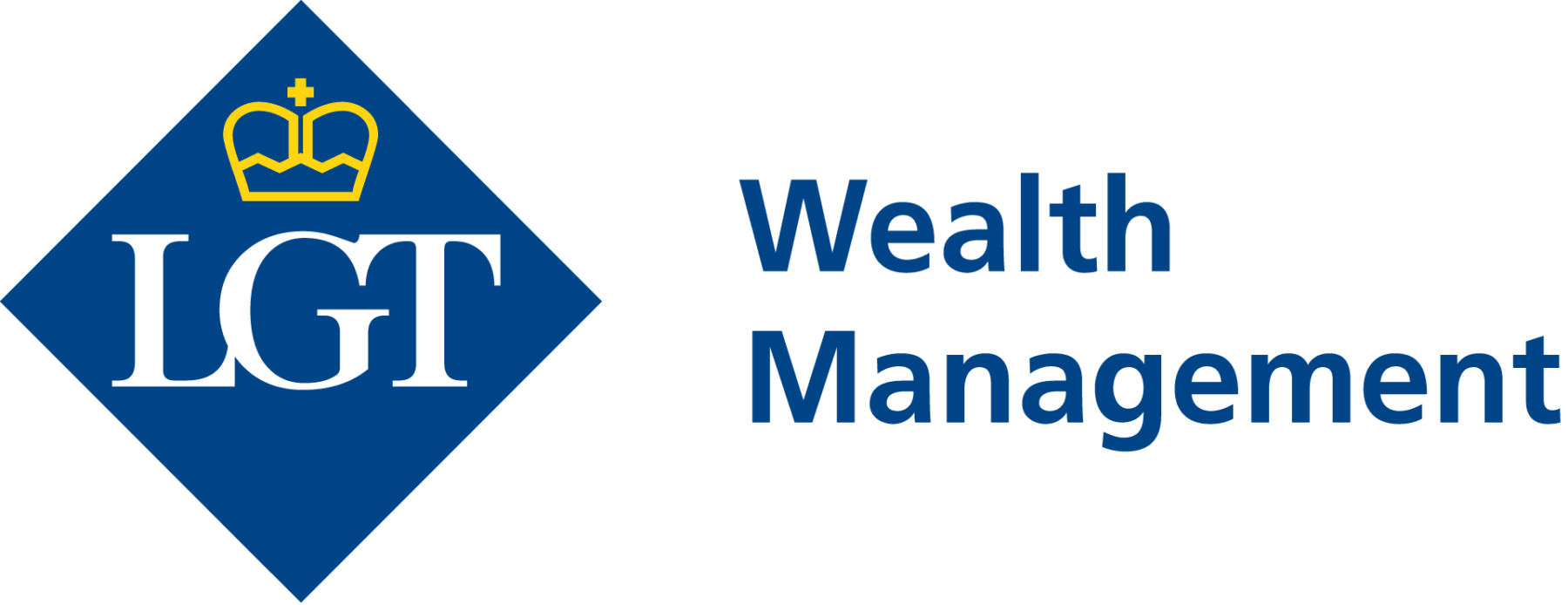
The Passive Investing Paradox
Henry Wilson (LGT Wealth Management) discussed the risks of over-reliance on passive funds, including the concentration risk in a few large companies (eg MAG 7). Because of this concentration of returns (and risk) to fewer, larger companies he believes that true diversification is under threat, valuations are higher, future returns are compromised…
… BUT as Harry Markowitz, the architect of Modern Portfolio Theory & Efficient Frontier said “Diversification is the only free lunch to investing”.
Therefore while passive investing remains a useful tool, LGT and Spectrum advocate for highly diversified, actively managed portfolios to help manage risk and improve long-term returns.
If you are going to own passive investments you have to be active with them.

Model Portfolios & Adviser Alpha
Matthew Lamb (Pacific Asset Management) explored the evolution of model portfolios and the increasing role of technology. With many portfolios becoming similar, the real value lies in the advice given—not just the investments chosen.
This fits strongly with my recent newsletter about risk (click here) – If most ‘Balanced’ portfolios are similar to each other and most ‘Growth’ portfolios are similar to each other then the outcome for you, as my client, is not in picking between two balanced funds or two growth funds… it’s ensuring we choose correctly between Balanced or Growth in the first place!!
Good risk profiling conversations make sure we start in the right place.

Planning for the Summer
After almost 13 years, we’re finally heading to Australia for a long-overdue family holiday. We’ll be visiting my wife’s side of the family, who all live in Queensland. She’s been able to make a few trips in that time, but between school schedules, travel costs and a global pandemic, the children and I haven’t been back since 2013. We’ll be away for five weeks from the end of June and are really looking forward to the trip.
I’ll still be checking emails and messages periodically, but if you’d like to catch up — whether by phone, Zoom or in person before we go — please do get in touch or book something in the calendar before Friday 27th June.
All being well, I’ll be back at my desk (with a fair dose of jet lag) on Wednesday 6th August.
Lions V’s Australia
Of course, seeing family and friends is the main priority — but I’d be lying if I said there wasn’t something else I’m particularly excited about.
As a lifelong rugby fan, getting the chance to see the British & Irish Lions take on Australia in both the 1st and 3rd Test Matches — plus the Queensland Reds in early July — is nothing short of a bucket list experience for me.
As always, if there’s anything you’d like to go over before I head off, just let me know. And if anything comes up while I’m away, I’ll do my best to ensure it’s handled smoothly.
Contact me if you have any questions via the below channels, or the booking system – always drop me a quick message if you need a time slot outside of those available.
Mobile & Whatsapp: +33 6 87 13 68 71
Email: peter.brooke@spectrum-ifa.com
Calendly booking system: https://calendly.com/peterbrooke/30min
Behavioural Confirmation: The Sneaky Culprit Behind Your Wallet’s Woes
By Tom Worthington
This article is published on: 27th May 2025

Ever feel like your wallet has a mind of its own? You set out to save, but somehow end up splurging on that fancy coffee machine or the latest gadget. Let’s delve into the psychological phenomenon known as behavioural confirmation and see how it might be influencing your financial decisions.
What Is Behavioural Confirmation?
Behavioural confirmation is a type of self-fulfilling prophecy where our expectations about others lead them to behave in ways that confirm those expectations. In the realm of personal finance, this can manifest when we project our beliefs onto our spending habits, leading to outcomes that align with those beliefs—even if they’re detrimental.
Spending Habits: The Self-Fulfilling Cycle
Imagine believing you’re terrible at budgeting. This belief might cause you to avoid tracking expenses, leading to overspending, which then reinforces your initial belief. It’s a vicious cycle where your expectations shape your behavior, confirming your original assumption.
Similarly, if you think you’re a savvy investor, you might take on riskier investments without proper research, leading to potential losses that challenge your self-perception.
Investments: Confidence vs. Overconfidence
Believing in your investment prowess is great, but overconfidence can be costly. You might ignore warning signs or dismiss advice, thinking you know best. This can lead to poor investment choices, reinforcing the belief that the market is unpredictable, rather than acknowledging personal missteps.
Imagine believing you’re the next Warren Buffett after a couple of successful trades. This mindset, while empowering, can sometimes lead investors astray. Overconfidence bias is a well-documented phenomenon in Behavioural finance, where individuals overestimate their knowledge, underestimate risks, and exaggerate their ability to create returns.
Initial Success: An investor experiences early gains, attributing success solely to personal skill.
- Increased Risk-Taking: Buoyed by confidence, the investor undertakes riskier investments without thorough analysis.
- Neglecting Diversification: Believing in their ability to pick winners, the investor concentrates holdings, ignoring the benefits of a diversified portfolio.
- Ignoring Contradictory Information: The investor dismisses data or advice that challenges their beliefs, leading to potential blind spots.
- Potential Losses: Without proper risk assessment and diversification, the investor becomes vulnerable to market downturns, leading to significant losses.
Real-World Implications
- Excessive Trading: Overconfident investors often trade more frequently, incurring higher transaction costs and taxes, which can erode returns.
- Underestimating Risks: Believing they can predict market movements, these investors may overlook potential pitfalls, leading to investments in volatile or unsuitable assets.
- Confirmation Bias: Overconfident individuals tend to seek information that supports their views, ignoring evidence to the contrary, which can reinforce poor investment choices.
Mitigating Overconfidence
- Seek Diverse Perspectives: Engage with financial advisors or peers to gain different viewpoints and challenge personal assumptions.
- Implement Checklists: Before making investment decisions, use a checklist to ensure all factors, including risks and alternatives, are considered.
- Embrace Humility: Recognize the limits of personal knowledge and remain open to learning and adapting strategies.

Breaking the Cycle
To combat Behavioural confirmation:
- Self-awareness: Regularly assess your financial beliefs and challenge negative assumptions. Don’t start saving tomorrow, start saving today.
- Seek feedback: Discuss financial decisions with trusted individuals to gain different perspectives. This is exactly what a financial adviser can help you with.
- Stay open to options presented to you.
- Set realistic goals: Establish achievable financial objectives to build positive reinforcement loops.
Think of your financial beliefs as that friend who insists they’re bad at directions. Every time they get lost, they say, “See? I told you!” But maybe, just maybe, if they used a map or GPS, they’d find their way. Similarly, by challenging our financial self-perceptions and seeking guidance, we can navigate towards better financial health.
At the Spectrum IFA Group we can help you by being your GPS through the financial world and design your bespoke road map to make sure we you get to where you want to go.
Why Now Is a Surprisingly Good Time to Invest (Yes, Really!)
By Michael Doyle
This article is published on: 25th May 2025

I Do Love a Bargain
I know it’s almost summer, but is there anything better than the hope and expectation that builds around Christmas. It’s the best time of the year for me.
Not only do we get to enjoy all the trappings that come with the festive time of year but on Boxing Day the madness begins!!!!
The trainers that were €130 have been reduced to €60, the jacket that was out of reach at €400 is now €240, the sports T-shirts that just 2 days ago were €40 are now €20. What a time to buy.
There’s something similar happening in the markets right now and I just wanted to take a few minutes to explain why I think now could be a great time to invest.
Volatility is a Discount in Disguise
The markets have been bumpy — and that’s a gift in plain wrapping. Volatility creates opportunities. Quality companies with strong fundamentals often get marked down along with the rest of the market, offering savvy investors the chance to buy value at a discount. If you’ve read my other articles, you’ll know I’m partial to the odd quote from Warren Buffett: “Be fearful when others are greedy and greedy when others are fearful.” Right now? There’s more caution than confidence. That’s your opening.
Inflation Is Cooling. Rates May Follow
While central banks have taken us on a wild ride with interest rates, there are early signs of stabilization. Inflation is cooling in many regions. As economic data settles, interest rates may begin to ease, restoring more predictable conditions for both equities and bonds. Those who position themselves before the pivot are typically the ones who benefit most.
The Power of Time Is on Your Side
Time in the market beats timing the market — every time. The longer your money is invested, the more it compounds. Trying to wait for the “perfect” moment often leads to missed gains. Historically, the market’s best days tend to cluster near its worst days — miss those, and you risk missing most of the upside.
I wrote an article on this a few years back which still holds true today. You can read it here.
Innovation Hasn’t Slowed Down — It’s Accelerating
From AI and biotech to clean energy and space tech, we’re witnessing a new industrial revolution. These aren’t just exciting ideas; they’re multi-trillion-euro transformations already reshaping global economies. Investing now means getting in before the wave crests — not after.
Diversification Is More Powerful Than Ever
The global landscape is broader than ever. While some markets face headwinds, others are thriving. A well-diversified portfolio — across sectors, regions, and asset classes — isn’t just a shield, it’s a springboard. With the right structure, you can grow your wealth through both sunny and stormy weather.

So, Why Now?
Because uncertainty is the soil where opportunity grows. Because prices reflect fear, not fundamentals. Because the future isn’t waiting — it’s happening now.
As your financial adviser, my job is to help you see the forest through the trees, and to guide you with strategies that match your goals, timeline, and comfort level — especially when others are sitting on the sidelines.
Let’s have a conversation. Your future wealth might just thank you for acting today.
The best time to invest? Yesterday. The second-best time? Right now.
You can now book a 30 minute zoom meeting with me (at your convenience) by clicking here
Basic Investment Terms Explained
By Michael Doyle
This article is published on: 22nd May 2025

I’m Scottish and I live between France and Luxembourg. I moved to Luxembourg in 2008 and then France around 2015 and have commuted between both for a lot of my time with Spectrum. Needless to say my French has improved over time (as long as people speak to me as if I’m 6 year old child).
One of the things though that I still struggle with is some of the terms they use, eg Pédaler dans la semoule which seemingly means going around in circles. I always wondered why people were pedalling around in semolina.
It got me to thinking that I often assume people know all of the terms we use in financial planning, so here I’ve decided to try and break down the barriers.

What is a stock?
A stock represents partial ownership in a company. When you own a stock, you own a slice of that business — known as a “share” — and have a claim on its assets and earnings. Stocks are traded on public exchanges, and their value fluctuates based on the company’s performance, investor sentiment, and broader market conditions. Investors often buy stocks to participate in a company’s growth and, potentially, receive dividends.
What is a share?
A share is a single unit of ownership in a company, essentially your piece of the total stock issued. If a company issues 1 million shares and you own 10,000 of them, you own 1% of the company. Shares entitle the holder to a portion of the company’s profits (via dividends) and voting rights in some corporate decisions. Shares can rise or fall in value depending on market demand and the underlying company’s performance.
What is a bond?
A bond is a type of loan that investors give to governments, municipalities, or corporations. In return, the issuer agrees to pay back the principal amount on a set date and provide regular interest payments over the life of the bond. Bonds are considered fixed-income investments and are often used to provide portfolio stability and predictable income, especially in contrast to more volatile assets like stocks.
What is an ETF?
An ETF, or Exchange-Traded Fund, is a pooled investment vehicle that holds a diversified basket of assets — such as stocks, bonds, or commodities — and trades on a stock exchange like a regular share. ETFs allow investors to gain broad market exposure, often at a lower cost and with greater flexibility than mutual funds. They are popular for their diversification, transparency, and ease of access for both beginners and seasoned investors.
Let’s have a conversation. Your future wealth might just thank you for acting today.
You can now book a 30 minute zoom meeting with me (at your convenience) by clicking here.
Why Should I have an Assurance Vie?
By Michael Doyle
This article is published on: 20th May 2025

I wrote an article back in 2021 which you can read here. I just wanted to offer a reminder of the 10 most important reasons why you should consider having an Assurance Vie whilst living in France:
- Tax Efficiency: Assurance vie allows for tax-deferred growth on income and gains while the funds remain within the policy.
- Flexible Investment Options: With my help and planning you can choose from a variety of funds, including equity, bond, and special products, allowing for a diversified investment strategy.
- Access to Capital: You have full access to your capital at all times, with the option to take regular income withdrawals (possibly subject to an early exit penalty in the early years).
- Inheritance Planning: Assurance vie is highly effective for inheritance planning, allowing policyholders to designate beneficiaries and providing significant tax-free allowances.
- Long-Term Savings: It serves as a viable alternative to traditional pension plans, offering flexibility in saving for retirement.
- Potential for Higher Returns: By investing in unit-linked funds, there is potential for higher returns compared to traditional savings accounts.
- Social Charges on Gains: Only the gain element of withdrawals is subject to social charges, which can be advantageous compared to other investment vehicles.
- International Options: International assurance vie policies offer additional benefits, such as investment in multiple currencies and broader investment choices. We offer these at Spectrum meaning if you move country your Assurance Vie is often portable.
- Adaptability to Risk Tolerance: We offer regular reviews so can switch funds as your circumstances or attitudes toward investment risk change.
- Tax-Free Allowance After Eight Years: After eight years, gains can be offset against a tax-free allowance of €9,200 for couples or €4,600 for singles, enhancing tax efficiency.
You can now book a 30 minute zoom meeting with me (at your convenience) by clicking here.
Top financial tips Spain May 2025
By Chris Burke
This article is published on: 8th May 2025

Happy (Almost) Summer, everyone!
So far this year, the weather has been very unusual, to say the least. Hopefully, things will start to feel a bit more normal soon – which brings me nicely to the financial world, which has been anything but normal! Sometimes it feels like many of us are just pawns in the game that very powerful people play.
In my world, however, many of these ‘games’ are understandable from a financial perspective, and we don’t panic. Instead, we factor in all scenarios and focus on the medium- to long-term goals for our clients.
This month, I’ve put myself in my readers’ shoes and asked:
“What financial planning should I be doing while living in Spain?”
Whether you’re new to Spain (generally considered to be less than three years) or well-established, it’s important to stay financially organised and understand what actions you need to take.
Living abroad as an expatriate requires thoughtful financial planning to navigate both Spanish and international financial systems. Here are the key areas to consider:
1. Understand Tax Residency and Obligations
In Spain, spending over 183 days within a calendar year establishes you as a tax resident, meaning your worldwide income and assets may be subject to Spanish taxation. It’s crucial to understand the rules around tax residency to avoid unexpected liabilities.
2. Strategise Property Sales and Investments
If you own property in your home country, consider carefully when to sell. Selling property in the same tax year you become a Spanish resident can lead to significant capital gains taxes. Planning the sale before relocating may help mitigate this issue.
3. Establish a Comprehensive Estate Plan
Creating a Will that covers both your home country and Spain is essential to ensure your assets are distributed according to your wishes. It’s wise to consult with advisers experienced in cross-border estate planning to navigate the complexities.
4. Optimise Currency Management
Managing currency exchange efficiently can help minimise losses due to fluctuating exchange rates. Consider using multi-currency accounts or international banking services to provide greater flexibility and cost savings.
5. Savings, Investments & Pension Planning
Ensure these are structured to reduce future tax liabilities—whether that’s for withdrawals, passing assets to your spouse or children, or aligning with your investment expectations (e.g., risk/reward balance). Most importantly, work with someone you trust to help manage these assets.
6. Consult with Experts
Whatever your budget, make sure you work with a recommended lawyer, tax adviser, accountant, and financial adviser. In Spain, you are considered guilty until proven innocent, and it can take years to resolve legal issues—during which your bank accounts or assets may be frozen. Many expats are unaware of this, especially if they come from countries where the opposite presumption applies.
7. Use Your Life Experience
When choosing the right advisers, trust your gut—or your “spider senses,” as I like to call them. You’ve built up intuition through life experience, and more often than not, it’s spot on.
Engaging with financial advisers who specialise in expatriate services can provide tailored guidance on investment strategy, tax planning, and navigating financial matters in both Spain and your home country.
By proactively addressing these areas, you can establish a solid financial foundation for your life in Spain – ensuring both compliance with local regulations and alignment with your long-term goals.
I’m here to help you get organised and take those financial worries away. If you’d like to discuss any of the topics above in more detail, or would like an initial consultation to explore your personal situation, you can do so here.
Click here to read independent reviews on Chris and his advice.
Navigating Market Volatility
By Tom Worthington
This article is published on: 5th May 2025

How It’s Impacting Investors and What’s Driving It
In today’s economic rollercoaster, market volatility has become a feature, not a bug. Thanks to inflation, interest rates, and politicians who change their stance more often than they change their ties, investors are left riding waves of uncertainty
What Is Market Volatility?
Market volatility refers to how wildly asset prices swing around. It’s measured with stats like standard deviation or the VIX—aka the “fear index.” When VIX is high, it means traders are about as calm as a cat in a bathtub.
Think of volatility like a political debate: a lot of shouting, some overreactions, and nobody quite sure what the outcome will be—but everyone’s got an opinion.
How Volatility Is Affecting Buyers
- Increased Risk Aversion
When markets get shaky, investors run for the hills—or more precisely, into gold, bonds, or the financial equivalent of curling up under a blanket and binge-watching Netflix: cash. It’s not that they don’t want to invest; it’s just hard to focus on stocks when the economy’s behaving like a budget committee after three espressos.
- Short-Term Focus and Emotional Decisions
High volatility often leads to panic selling and FOMO buying—essentially the investment version of speed-dating your portfolio. One bad news headline and people dump their assets faster than a politician deletes tweets after a scandal.
- Greater Demand for Diversification and Alternatives
With public markets swinging like a metronome at a concert, investors are looking elsewhere: real estate, private equity, and alternatives that don’t fluctuate every time a central banker clears their throat.
Alternative strategies are basically the Switzerland of investing—neutral, quiet, and generally unaffected by the chaos going on next door.
- Hesitation in Major Life Investments
When markets are turbulent, people freeze. Buying a house. Starting a business. Investing in that avocado farm you saw on Instagram?! Better wait until the economy isn’t throwing daily tantrums like it’s on a sugar high.

What’s Causing the Current Volatility?
Geopolitical Tensions
Let’s face it—if the markets had a relationship status, it would be “It’s complicated.” Global tensions (Ukraine, Middle East, China-US trade) have created an environment where investors are just one diplomatic gaffe away from selling everything and moving to the woods.
And with international summits resembling more of a group therapy session than a solutions meeting, it’s no wonder markets are twitchy.
Inflation and Central Bank Policy
Central banks are trying to tame inflation with interest rate hikes—kind of like trying to put out a grease fire by hitting it with a calculator. Every time Jerome Powell or Christine Lagarde so much as raise an eyebrow, markets react like they just heard tax hikes are back on the menu.
Recession Fears
Recessions, Soft landings, Hard landings… No landing? At this point, the economy is basically being piloted by someone reading the instruction manual upside down. With mixed signals and conflicting forecasts, markets are responding like passengers on a turbulent flight—fastening their seatbelts and ordering strong drinks.
Tech and Social Media Hype
Social media has turned investing into part-time entertainment. Between Reddit-fueled pump-and-dumps and influencers recommending crypto in between smoothie recipes, market swings have become more meme than metric. Add algorithmic trading and you’ve got a digital casino with fewer rules and more drama than the House of Commons.
Earnings Uncertainty
Earnings season now feels like a bad date—lots of build-up, dramatic reveals, and someone always ends up disappointed. With rising costs and unpredictable demand, analysts are doing more guesswork than polling firms during a leadership race.

How Investors Can Respond
Here’s what smart investors are doing—besides stress-eating during market dips:
- Keep a long-term perspective: Ignore the noise—just like a seasoned voter during campaign season.
- Diversify: Don’t put all your eggs in one economic basket—especially if that basket is being carried by a toddler on roller skates.
- Use euro-cost averaging: Invest steadily over time, so you’re not stuck trying to time the market like a trying to explain your latest impulse buy to your other half.
- Hedge your bets: Consider options and other protections—because unlike political promises, these can actually reduce risk.
- Stay informed, not alarmed: Headlines sell panic; good decisions are made with data, not doomscrolling.
Conclusion
Volatility might be nerve-wracking, but it’s not the enemy. It’s a changing a nappy—messy, emotional, and always changing—but ultimately navigable if you stay calm, stay smart, and remember that every cycle, no matter how wild, eventually turns.
So hold onto your investments, keep a sense of humour, and remember: if in doubt talk to your adviser.
Financial update May 2025 – France
By Katriona Murray-Platon
This article is published on: 4th May 2025

May is when France comes out to play because the weather is warmer and the days are getting sunnier. However it is also the month when, if you haven’t already begun your tax declaration, you need to at least make a start on it over the next few weeks. The first deadline for filing the tax return is the 20th May for the paper returns which you will need to complete if this is the first year doing a tax return and you don’t have a tax number or login details to do it online.
The other deadlines for submitting both your income tax return and where applicable, your Wealth Tax return, are as follows:
| DEPARTMENT | DEADLINE |
| 0 to 19 | Thursday 22nd May 2025 at 11.59pm |
| 20 to 54 (including 2A and 2B) | Wednesday 28th May 2025 at 11.59pm |
| 55 to 974/976 | Thursday 5th June at 11.59pm |
| Non residents | Thursday 22nd May 2025 at 11.59pm |
If you do not at least attempt to get some sort of declaration submitted by these deadlines a 10% penalty will apply to the amount of taxed owed. Luckily, Spectrum has a free tax guide which you can find HERE. If you have any questions on this guide, please do get in touch.
I know that it may seem daunting and believe me, even though I was a tax adviser and used to do hundreds of declarations for my clients, I still find doing my own quite a challenge! So to help you, here are my ten top tips:
- HAVE YOUR FIGURES READY– Make sure that you know what kinds of income you need to declare and what the total annual figures are, whether they are taken off a bank statement or a tax certificate.
- KNOWING THE EXCHANGE RATE: The Banque de France average exchange rate for 2024 is €1.18 to £1. This is also the rate used by the Connexion newspaper. Make sure you have all your foreign income figures converted into Euros ready to input into the tax form.
- CHECK THE FIGURES ALREADY ENTERED ON THE TAX FORM – French source income (pensions, salaries, French bank income etc) should already be entered on the tax form. Whilst this information is generally correct, it is still worth checking these figures with any tax certificates issued by the relevant body or your December 2024 payslip.
- FOREIGN INCOME ANNEXE – I have noticed this year that whilst some annexe forms such as the 3916 are automatically ticked and carried over from the previous year, the 2047 for foreign income is not. You will therefore have to tick this box in the ANNEXE section of the online form to make this form appear. You must enter all foreign income received in 2024 on this form and then make sure that it is carried over or inputted again into the main 2042 tax form.
- CHECK THAT ALL THE DIFFERENT TYPES OF INCOME ARE TICKED – This applies on both the 2047 form and the main tax form (2042) as when you then click to the next page you will only be shown the boxes and pages that correspond to the income selected on the earlier page. So if you are only declaring pensions and bank interest, only those pages will appear. If you have other income like rental income or business income, you need to tick the relevant box for the page to appear. You can also look at the declaration that you did last year under the “documents” section on the main page and see what boxes you completed last year, then you can use the “search box” option.
- REMEMBER THE BANK ACCOUNTS AND UPDATE THE ASSURANCE VIE AMOUNTS – All non-French accounts must be declared on the 3916 form. This should automatically appear as a form if you declared accounts last year and boxes 8TT and 8UU were ticked. Any accounts you declared last year can be carried forward but if there are any changes, any new accounts or closed accounts, you must provide this information. Your assurance vie information will also be carried forward from last year but you will have to check the letter that was sent to you by the assurance vie provider in order to enter the value of the policy as at 1st January 2025.
- DON’T FORGET YOUR TAX CREDITS – If you have any domestic help or services paid via CESU, the amounts declared will be already entered on the tax form, you just need to check that these are correct. However if you have had any other home help (cleaners; gardeners, child care, after school lessons etc) from private companies or associations, these amounts are not always automatically entered. The company or association should have sent you a tax certificate for last year so you will need to enter that amount in the tax credit section. If you have a child in high school, sixth form or university, don’t forget to tick the box to get the (albeit small) tax reduction.
- RETIREMENT CONTRIBUTIONS – if you work in France and want to contribute to your pensions, it is a good idea to open a PER account. If you have already made contributions to a PER in 2024, you can deduct a percentage of these payments from your taxable income. The amount that can be deducted or carried over from previous years is shown on your tax statement. However to deduct these amounts from your tax you will need to reenter these amounts in the correct box.
- CHARITABLE DONATIONS – If you have made any charitable donations in 2024 you should have received a tax certificate from the charity with the amount to deduct. This may have been sent by email and fallen into your spam box so it is important to find the email or if it has been sent by post to keep the tax certificate in your tax file. If you still can’t find it you can contact the charity to send you another copy.
- NOBODY IS PERFECT (especially not me ;)) — you can start your declaration and go back to it later. You can do one version and then go back and change it. Once you get to the signature page which shows the tax due (this won’t appear if you have foreign income that will receive a tax credit) if something seems wrong you can go back and amend it. You can do this as many times as you like until the official deadline without it generating separate tax bills and even after the deadline provided you have submitted something before the deadline. If it gets close to the deadline it is better to declare something and sign the tax return and then correct it at a later date rather than incur a fine for late submission.

Property declaration – do you remember last year when you had do declare your properties as a separate declaration? This year you only have to declare whether there have been any changes in 2024. I noted on the online tax form that when you get to the signature page, you must tick a box saying there are no changes otherwise it will not let you sign off and send the tax return.
One of the welcome changes with the 2025 tax declaration is that couples will not be automatically taxed at the same rate but at their individual rates. This is particularly important for those paying tax at source on their pensions and salaries.
Until recently, couples were taxed at the same rate unless they opted for their individual rate which most people didn’t. The result of this was that, because women generally receive less than men when it comes to salaries and pensions, the woman was paying a disproportionate rate of tax. As from 1st September this will change and couples will automatically be taxed at their individual rate unless they opt to pay the same tax rate.
Unfortunately it is too late to contact tax advisers, tax lawyers or anyone else offering help with tax returns as they will be very busy completing the tax returns they already have, so don’t be surprised if they are not returning your calls or emails. However, with a bit of patience and perseverance it is possible to do your own tax return. If you have any questions please do get in touch and I will help as much as I can.


